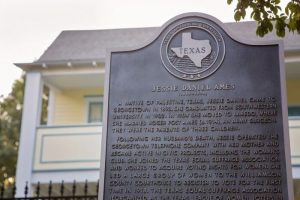Jessie Daniel Ames. From the Austin History Center.
Jessie Daniel Ames
Born: 1883 in Palestine, TX
Died: 1972 in Austin, TX
Noted For: Jessie Ames was the founding president of the Texas League of Women Voters, as well as one of the first white women in the South to advocate publicly against the crime of lynching.

On the left: Jessie Daniel Ames historical marker in Georgetown, TX. From Georgetown View Magazine.
If you could hop in a time machine and locate someone who knew Jessie Daniel Ames, they would likely tell you that she was not a woman to be trifled with.
Jessie’s inclination to overcome obstacles and brook no opposition showed itself early in life, when she faced down her father’s objections to convert to Methodism following her graduation from Southwestern University. (The church’s activism in women’s issues influenced Jessie’s later involvement with the votes for women movement.)
Jessie also refused to falter following the death of her Army surgeon husband, even though his passing left her a young widow with three children to support—in an era when women had limited earning opportunities. Instead, she went to work for the Georgetown Telephone Company, which was owned by her equally tough-minded mother, who was also a widow as well as a sister church activist.
Jessie organized the Georgetown Equal Suffrage League in 1916, and in 1918 she became the treasurer for the state suffrage association. That same year, she took an active role in the association’s historic 1918 drive to register thousands of Texas women in a 17-day period following the state legislature’s approval for women to vote in the Democratic primary.
In 1919, the year of ratification, Jessie was elected the first president of the Texas League of Women Voters. [link to LWV article]. Jessie was also chosen as a delegate for the Democratic National Conventions of 1920, 1924, and 1928.
Life after the amendment…
The most heinous and terrifying aspect of the Jim Crow era, the ongoing lynching of black Americans, was an issue that troubled many—but the entrenched racism of the period intimidated most people from speaking out. Jessie Ames wasn’t one of these people. In 1930, she founded the Association of Southern Women for the Prevention of Lynching, an organization that called for white women to band together and leverage their influence to put a stop to these crimes, once and for all.
White women who spoke out against lynching did so at risk to their personal safety, but that didn’t deter Jessie and her volunteers, who organized petitions, lobbied law makers, and conducted other successful campaigns, including the collection of 40,000 signatures on a formal pledge against lynching.
Ultimately, 81 organizations would join the anti-lynching platform that Jessie helped create. Jessie went into retirement in the 1940s, and lived long enough afterward to see further progress for women and African-Americans achieved during the civil rights era.
Additional Reading:
“Revolt Against Chivalry: Jessie Daniel Ames and the Women’s Campaign Against Lynching” by Jacquelyn Dowd Hall







